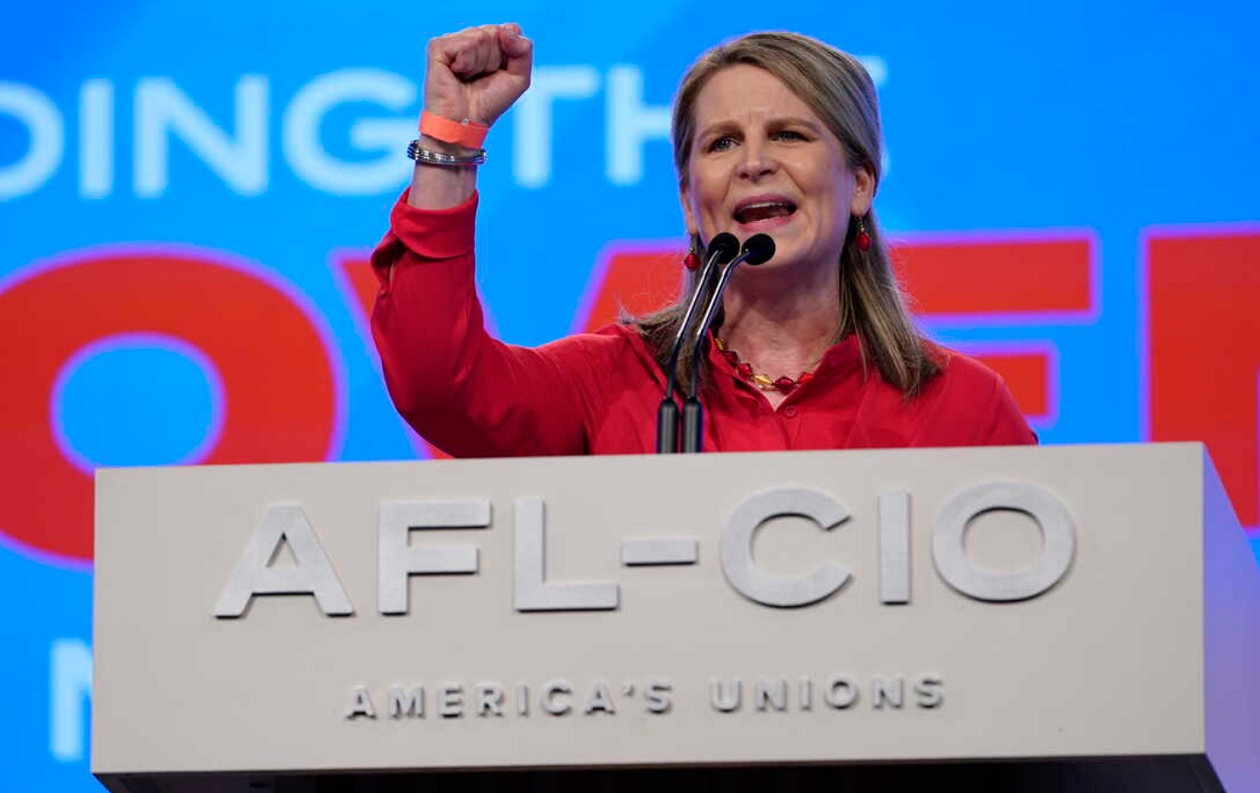
WASHINGTON—Senate Labor Committee Democrats gave strong support, but all but two of its Republicans ranged from cool to hostile as three top union leaders strongly pushed for enacting the Protect the Right to Organize (PRO) Act.
AFL-CIO President Liz Shuler, Service Employees President Mary Kay Henry, and Teamsters President Sean O’Brien said the comprehensive pro-worker rewrite of U.S. labor law is needed to, as Shuler put it, enact “simple steps to ensure fairness” in workplaces.
It also would be a boon to workers and their families, union and non-union, Shuler said.
“If you enjoy the weekend…unions made it happen. If you get overtime pay…unions got it done,” she said. “Unions are the single most powerful tool we have to demand the fair, just and equitable treatment of workers.
“Unions are the counterweight. The data is overwhelming: Workplaces with unions provide more predictable schedules, safer workplaces, and better benefits,” she declared.
Addressing not just the senators in front of her, but the viewing audience on the Health, Education, Labor and Pensions Committee’s livestream, social media, and other outlets, Shuler pointed out “a recent study showed if union density had not declined over the past few decades, the typical worker today would earn $3,250 more per year.
“I want to ask every working person watching today a simple question: What could your family do with an extra $3,250 per year?”
Led by PRO Act sponsor and committee chair Sen. Bernie Sanders, Ind-Vt., the panel’s Democratic majority agreed with the union leaders.
“At a time when unions are more popular than they have been in decades, we have got to make it easier for workers to exercise their constitutional right to form a union and collectively bargain for better wages, benefits, and working conditions,” Sanders said beforehand.
“The American people are sick and tired of the unprecedented corporate greed and illegal union busting that is taking place throughout this country. The time has come for multi-billionaire leaders of extremely profitable corporations to understand they are not above the law. When these billionaires and the enormously profitable corporations they run violate federal labor law, they must be held accountable.”
Sens. Mike Braun, R-Ind., and Lisa Murkowski, R-Alaska—who noted her state is heavily unionized—seemed receptive to some labor law changes. Braun and O’Brien met privately before the hearing to discuss bosses’ misclassification of workers as “independent contractors,” which denies them worker rights and protections. The PRO Act would curb the abuses.
The other Republicans lobbed softball questions at their party’s two witnesses, former NLRB Trump-era chair John Ring, now a senior partner at a big union-buster, and Mark Mix, the veteran CEO of the venal, vicious, corporate-funded National Right To Work Committee and its so-called legal defense fund.
Expected to pass legislation
The Senate panel, with a one-vote Democratic margin, is expected to pass the legislation, organized labor’s #1 priority for years. But the outlook after that is uncertain. That means workers and their allies have a lot of lobbying and mobilization to do.
Catering to the corporate class and its campaign of lies, notably from Mix, about forced unionism, and to the union-busters whose industry grosses $340 million annually, Senate Republicans may try to filibuster the measure to death on the chamber floor. Mix urged lawmakers to instead approve a national right-to-work law, a frequent Republican goal.
Even if the Senate Republicans fail, House Education and the Workforce Chair Virginia Foxx, R-N.C., would kill the PRO Act there, despite bipartisan support from more than 200 Democrats and Rep. Brian Fitzpatrick, R-Pa. Foxx once told Carolina media that unions shouldn’t legally exist.
To counter that pending corporate fusillade and pave the way for HELP Committee passage, Shuler, Henry, and O’Brien made the case the PRO Act’s reforms benefit workers and businesses, counter union-busting and employer repression, and combat corporate greed.
The PRO Act reforms include, but are not limited to, higher fines for labor law-breaking. It outlaws many of the tactics, notably so-called “captive audience meetings,” bosses use to thwart organizing drives. It would mandate immediate reinstatement of illegally fired workers and end many delays and barriers bosses throw up against unions, such as interminable appeals.
State so-called right-to-work laws, legalized by the 1947 Republican-passed Taft-Hartley Act, which Republican-run governments have enacted in 27 states, would be outlawed. That law also banned secondary boycotts. The PRO Act would overturn the ban.
The right-to-work ban drew outrage from the RTW committee’s Nix. “Compulsory unionism–where you can be fired for refusing to give union bosses a portion of your paycheck—is the reality for nearly half of American workers,” he complained, using common right-wing lies.
The PRO Act also would overturn a 1938 Supreme Court decision letting firms hire “permanent replacements”—scabs—for workers forced to strike for economic reasons. Firms cannot permanently replace workers fired during strikes forced by bosses’ unfair labor practices.
The measure would also order firms to recognize unions which achieve card-check majorities, even if the union loses the later election after boss pressure. And it would order bosses who bargain with unions on first contracts to reach agreement within 180 days or submit to mandatory arbitration.
Unionization benefits businesses, too, Shuler reminded everyone, because it leads to better workplace communication, stability, and cooperation for the common good. After all, she said at one point, unionized workers have a vested interest in ensuring their employers make more money.
“Yet, at this moment, the very right to organize is under attack. It is under attack from corporations that made billions in record profits, but refuse to pay their employees enough to afford rent or groceries” and “from CEOs who have yachts so big they need bridges in ports to be modified, but balk at providing workers in their factories with bathroom breaks.
Can buy many things
“These corporations and executives can buy many things. We cannot let them buy the basic rights of working people,” Shuler said.
“In 2022, corporations like Starbucks, Delta, Alphabet, and Apple posted some of their most profitable years in history. What do workers have to show for it? While pay for corporate CEOs increased over 1000% between 1978 and 2019, worker pay rose 13.7%.
“It’s no coincidence labor standards have plummeted as union density has declined in America. Workers face unpredictable schedules, understaffed and unsafe workplaces, and a lack of basic dignity on the job.” In recent years, federal estimates show
Protecting and strengthening the right to unionize, a goal last year’s Gallup poll shows 71% of the U.S. agrees with, would reverse those trends, Shuler, Henry, and O’Brien declared, by giving workers a seat at the bargaining table and more power to determine their futures and their lives, balancing power against bosses.
That’s not the case now, O’Brien and Henry elaborated. Instead, workers are subject to corporate whims, fiats, repression, favoritism, unsafe working conditions, and sudden loss of jobs—a point Henry and Sen. Tammy Baldwin, D-Wis., made—when firms pursue greater profits by suddenly shutting money-making U.S. plants and moving to low-wage right-to-work U.S. states or even lower-wage foreign countries.
“Crystal Orozco, a California fast-food worker who has been in the industry for 15 years, is one of the first people who comes to mind when I think of how the COVID-19 coronavirus pandemic unearthed many of the problems in our system,” Henry elaborated.
“When Crystal demanded COVID safety protections for herself and her co-workers, her managers threatened to cut her hours. When Crystal and her co-workers began to organize their workplace, they faced intimidation and opposition from their employer.
“When Crystal and her co-workers won a historic seat at the table for half a million California workers, fast-food corporations pooled their resources to put a landmark state labor law on hold and potentially overturn it.
“Sadly, this is just one of many examples of what we mean when we say the system is rigged against workers. Because Crystal’s experience is all too common among SEIU members, leaders in the Fight for $15 And A Union, partners with Starbucks Workers United, and all across the economy.”
“There are no meaningful consequences for businesses and CEOs like Starbucks” and its CEO, Howard Schultz, “when they break our labor laws,” O’Brien said. “When any employer—be they rail carriers, package companies, or coffee shops—gets away with repeated abuse of American workers, the legislators who let it happen are complicit in these crimes.”
Henry had one final message for lawmakers who reject workers’ rights: They too could be rejected, at the polls.
“We need leaders who advance the vision of unions for all and hold union-busting corporations accountable,” she said. “In turn, working people of all races and backgrounds will back politicians who take action to support their demands.”
People’s World has an enormous challenge ahead of it—to raise $200,000 from readers and supporters in 2023, including $125,000 during the Fund Drive, which runs from Feb. 1 to May 1.
Please donate to help People’s World reach our $200,000 goal. We appreciate whatever you can donate: $5, $10, $25, $50, $100, or more.













Comments